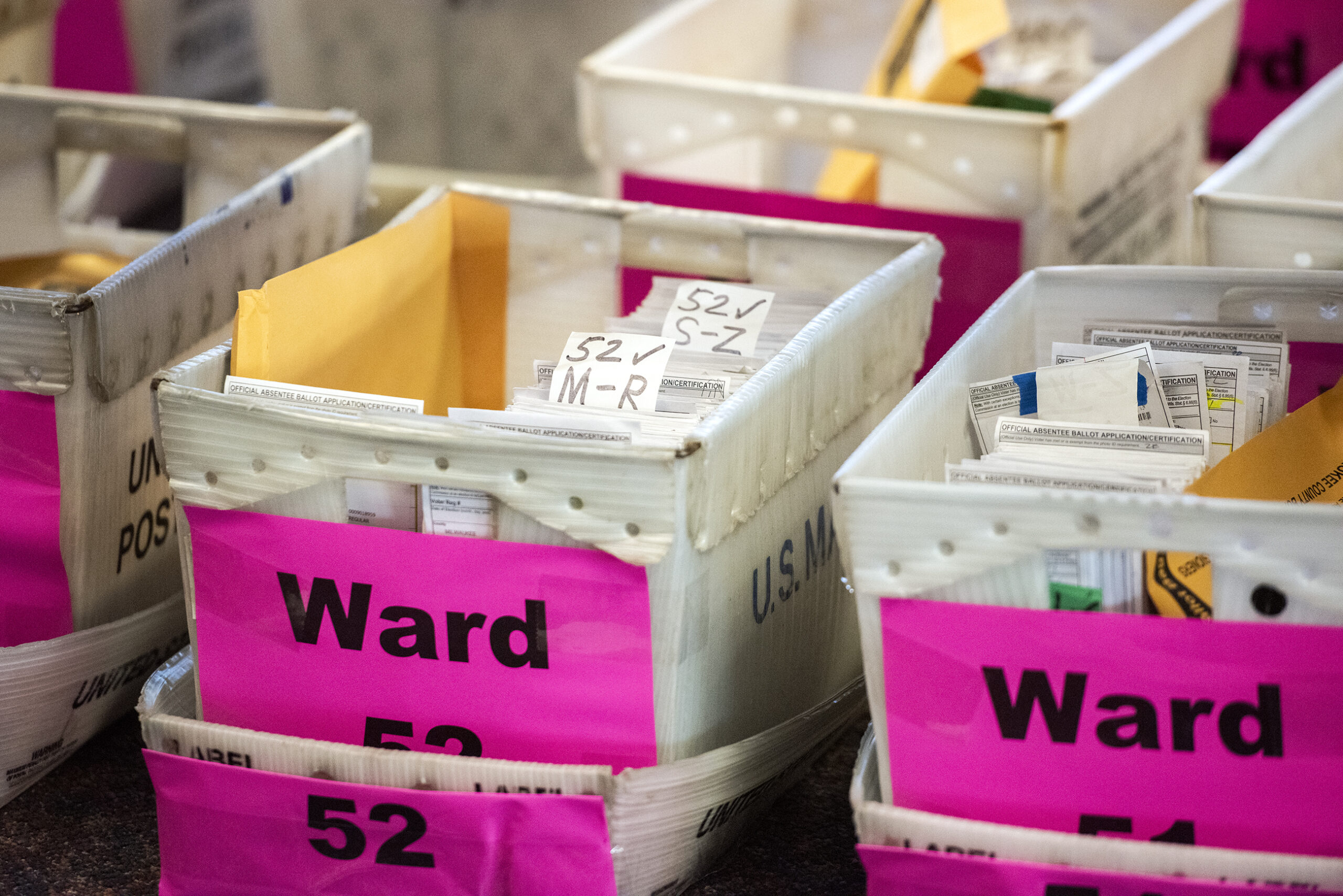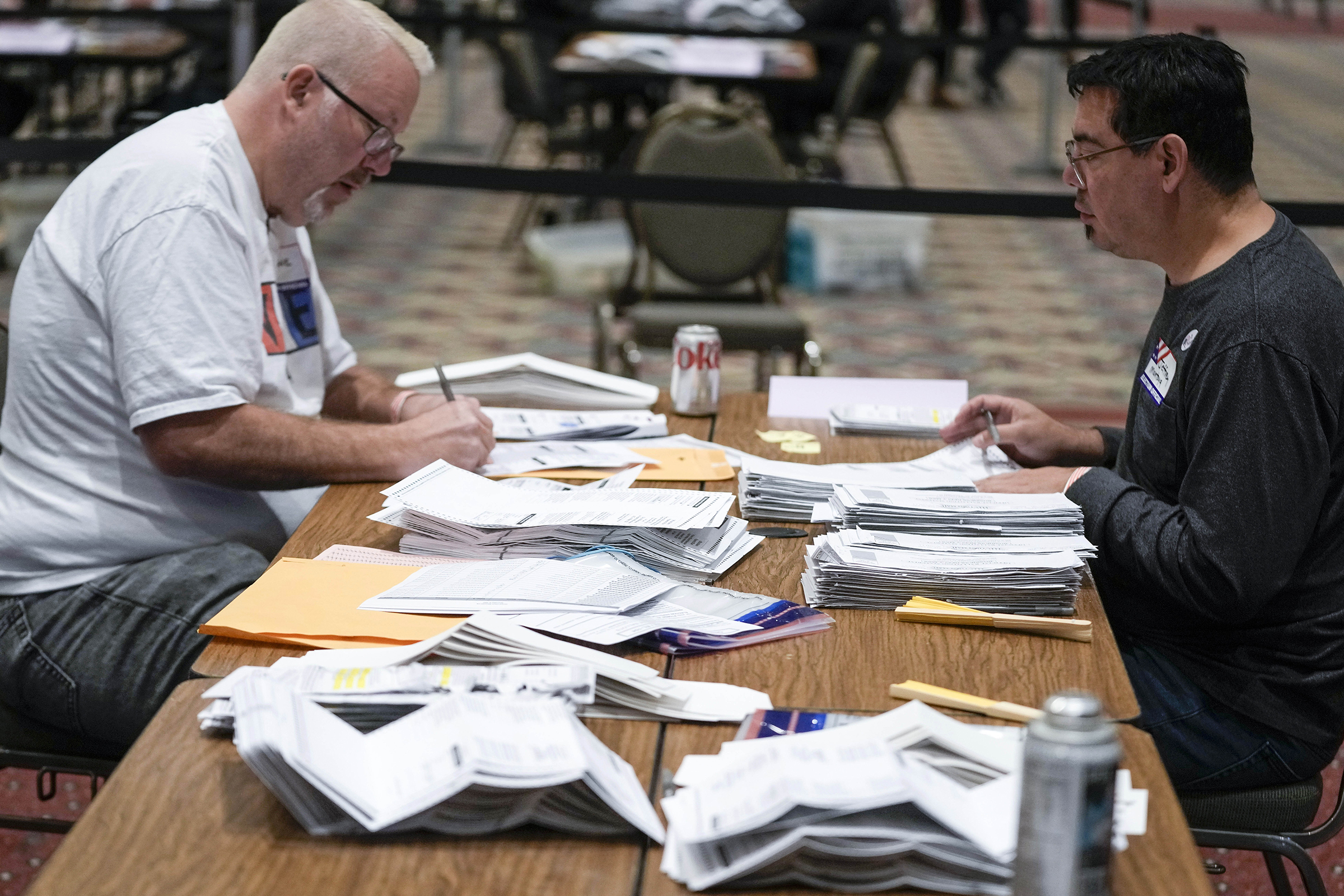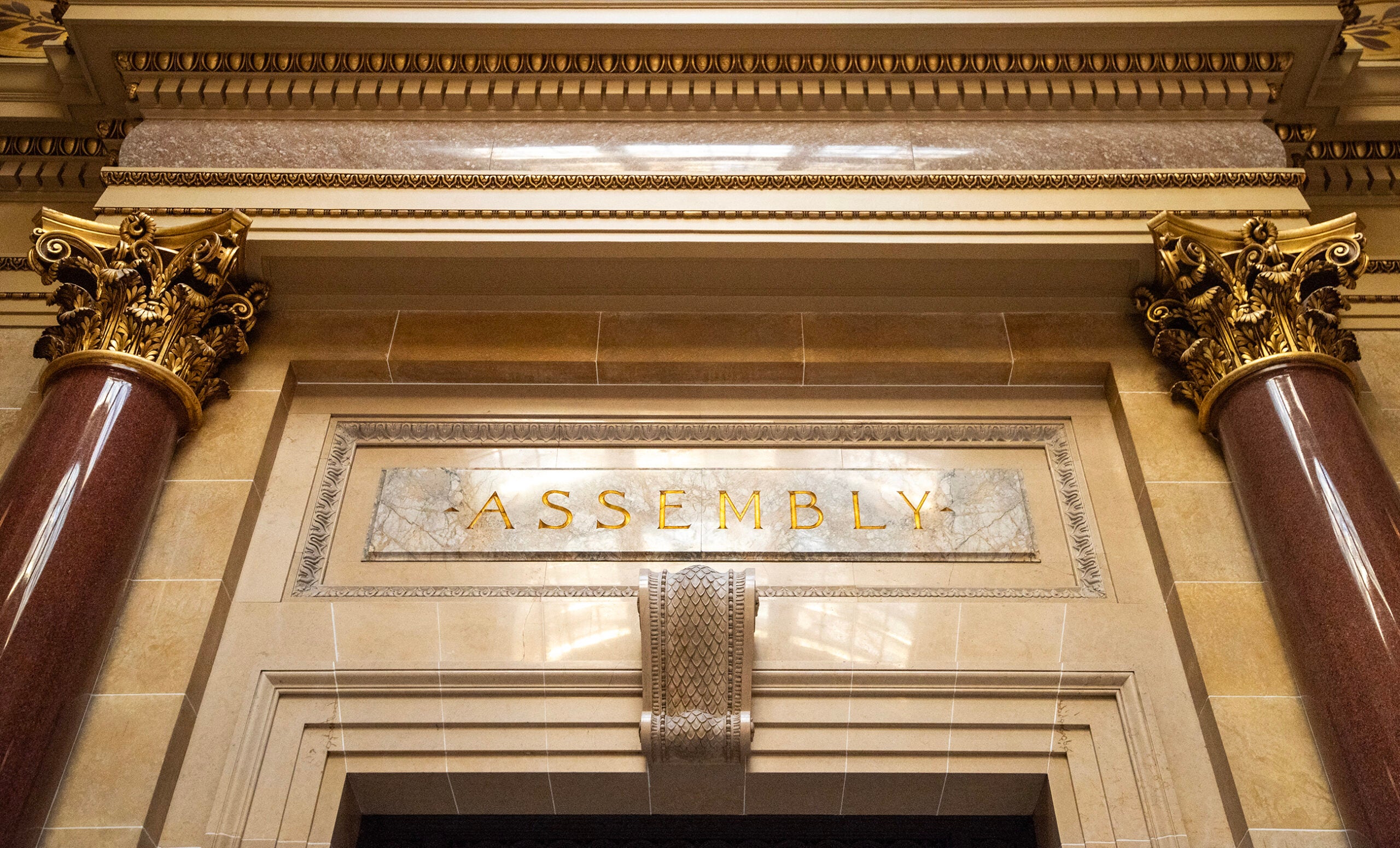The state Assembly took up several election bills Tuesday, including one that could change the process for absentee ballots in Wisconsin.
Voters are currently required to request an absentee ballot in writing, but there are no standard guidelines on what the request should look like.
On Tuesday, the Assembly voted in favor of a bill that would task the Wisconsin Elections Commission with issuing application guidelines and require all absentee voters to include a copy of their ID with every written ballot request.
News with a little more humanity
WPR’s “Wisconsin Today” newsletter keeps you connected to the state you love without feeling overwhelmed. No paywall. No agenda. No corporate filter.
It would also require that applications be separate documents from absentee ballot envelopes, which are currently used as de facto written ballot requests, and prevent local clerks or the Elections Commission from sending absentee ballots to anyone who hasn’t requested one.
Rep. Rick Gundrum, R-Slinger, said more uniform voting laws will make it easier for Wisconsinites to vote, an argument disputed by Democrats.
“This is common sense legislation that everyone can understand,” Gundrum said during a news conference before the Assembly session.
He also suggested the bill could help strengthen public faith in the elections process, a point opposed by Rep. Gary Hebl, D-Sun Prairie.
“These (laws) don’t strengthen anything except your ability to win elections,” Hebl told his Republican colleagues.
Democrats argued that the legislation could disenfranchise people who are unable to vote in person or resubmit their photo ID each time they request an absentee ballot. The measure passed along party lines.
The legislation is part of a package introduced by Republican senators in response to the 2020 presidential election, which has been criticized by members of the GOP. It passed the Senate earlier this month, as did a bill that would limit the way absentee ballots can be returned.
That bill could put an end to drives like “Democracy in the Park,” an initiative organized by Madison’s city clerk in 2020, which allowed voters to return their ballots at outdoor events. The new legislation would require absentee ballots to be collected by the clerk or their staff at one site nearby their office within 14 days of the election. The Assembly voted in favor of the bill with a small amendment, so it will return to the Senate before going to Gov. Tony Evers.
The Assembly also passed another measure that’s already made it through the Senate, requiring nursing homes to notify the family of residents in advance of visits from voting assistants, and make it a felony for nursing home staff to attempt to influence the way residents vote should they be tasked with serving as a voting assistant during a future pandemic.
Sponsor Rep. Cindi Duchow, R-Town of Delafield, argued that the legislation protects elderly voters who live in long-term care settings, while the bill was opposed by Democrats in the Legislature.
The Assembly also voted in favor of imposing strict penalties — up to $10,000 and three years in prison — for elections officials who violate certain rules. They include intentionally failing to report election fraud, causing a valid vote to be rejected or causing an invalid vote to be counted.
In a news conference before the session, Rep. Mark Spreitzer, D-Beloit, said Republicans sowed doubts after the 2020 presidential election, with former President Donald Trump making unsupported claims of widespread fraud. With these bills, he argued, Republicans are aiming to solve problems that don’t really exist.
Wisconsin isn’t the only state that’s seen a Republican-led push for stricter voting laws this year. New election laws in Georgia led Major League Baseball to move its All-Star Game from Atlanta. Arizona, Florida and other states have also passed laws that could deter voters from casting ballots in future elections.
Wisconsin lawmakers also approved a GOP bill that would require election observers to wear a badge displaying their name and organization, if applicable, and impose penalties for observers who interfere with voters or refuse to leave when asked.
The Assembly also approved a bill Tuesday requiring elections clerks to retain any recordings of election night canvassing for at least 22 months. Rep. Shae Sortwell, R-Two Rivers, said the legislation is in direct response to complaints following Green Bay’s November 2020 election. The city livestreamed its ballot counting but didn’t retain the video as it wasn’t required to do so by state law.
Rep. Kristina Shelton, D-Green Bay, said the legislation could prevent municipalities from broadcasting their election results if it doesn’t come with additional funding. She noted Green Bay’s video was deleted by YouTube, where it was streamed, because it’s the site’s policy to delete videos longer than 12 hours.
The measure already passed the state Senate on a voice vote.
Evers has the power to veto the bills that moved through the Legislature. Evers has indicated he will veto any plans that make it harder to vote.
Assembly Approves Loan To Purchase Verso Paper Mill, Other Budget Items
In addition, the Assembly worked through a hefty agenda that included a handful of bills that would earmark federal funding for specific state projects.
Those included a bill that would spend $50 million in federal money to set up a loan to help Consolidated Cooperative purchase the Verso paper mill in Wisconsin Rapids, as well as $15 million to fund the Park Falls paper mill. It passed 63-35 in the Assembly and was sent to the Senate.
Despite voting in favor of the bill, Rep. Katrina Shankland urged the Assembly to accept an amendment that would remove language referencing the American Rescue Plan Act of 2021 as the source of the funding. Democrats have opposed Republican efforts to determine how money from the act is spent, arguing it should be delegated by Evers. As it stands, she said, Evers may veto the bill due to uncertainty over whether the funds can legally be used for the loan.
The mill closed before it suffered damage from a fire earlier this year. Introduced by Rep. Scott Krug, R-Nekoosa, the bill would use COVID-19 relief money to help the co-op finance the purchase of the defunct facility under terms set forth by the Wisconsin Economic Development Corp.
Krug said the mill closed due to challenges brought on by the pandemic, and he expressed frustration that Shankland’s amendment didn’t arrive sooner. He claimed Democrats haven’t been proactive when it comes to addressing the mill, which was a major job provider in his region.
Evers had previously proposed funding the loan by accepting $1.6 billion in federal funding for an expansion of BadgerCare, an idea GOP lawmakers rejected.
The Assembly took up other legislation on local spending, including a proposal that would allocate $5 million in funds from the federal American Rescue Plan Act to help Green Bay move the large coal piles that have long sat along the Fox River near the city’s downtown. The plan received some bipartisan support in the Assembly, passing 62-36.
Republican and Democratic representatives from the Green Bay area spoke in favor of the bill. Rep. David Steffen, R-Green Bay, called the project a Halley’s comet of economic development opportunity. The bill was referred to the Senate.
The Assembly also approved two bills that would direct money from the American Rescue Plan Act as grants to Memorial Hospital of Lafayette County and the city of Reedsburg’s community center, and use money from the act to help the State Historical Society keep historical sites open this summer. Like with the paper mills, Democrats opposed the legislation because they think the governor should determine how the money is spent. Rep. Shelia Stubbs, D-Madison, noted that the Historical Society has been in talks with Evers to secure the funding it needs.
Legislature Approves Plan To Reduce Funding For Municipalities That Cut Police Spending
More than a year after the murder of George Floyd, the Assembly passed a bill that appears to be a direct response to calls from activists to defund law enforcement.
Under the proposal, any municipality that reduces its annual budget for growing or maintaining its police force will have its municipal aid payment decreased by the same amount. The bill’s sponsor, Rep. John Spiros, R-Marshfield, notes Milwaukee has recently cut more than a hundred police officers, and argues it’s not a coincidence that homicides have increased there.
The bill passed the Republican-led Senate on party lines earlier this month. Before the Assembly session, Spreitzer — a former city councilor — said it shouldn’t be up to state legislators to meddle with municipal budgets. Republican lawmakers should invest more in funding municipalities if they want communities to dedicate money to law enforcement, he said.
The bill will go to Evers, who’s come out against large cuts to police spending.
The Assembly also returned to a bill that will require law enforcement agencies to include in their use of force policies information on when and how the use of force should be reported. It also requires officers to report qualifying incidents when force is used, whether they observe it or engage in it. It also prevents agencies from disciplining officers who report violations of these policies.
Stubbs, a member of the Assembly speaker’s task force on racial disparities, opposed an amendment that moved the effective date of the legislation to Jan. 1, 2022, and eliminated language that said officers must report use of force incidents that they should have reasonably observed. But the amended bill was ultimately passed.
Lawmakers Could Vote On A Slew Of Other Bills
The Assembly agenda Tuesday also includes several other pieces of legislation.
Lawmakers passed a plan that will lower the age to receive a Wisconsin driver’s permit by six months, to 15 years old. The bill will be sent to Evers for his signature.
The assembly also passed a bill requiring government agencies and health care providers to enclose any mailings that could indicate a person’s vaccination status. It will go to the Senate next. Tuesday’s vote comes after the Assembly decided last week to ban so-called vaccine passports in Wisconsin — a move that’s likely to be vetoed by Evers.
The Assembly also voted to establish a grant program, administered by the Wisconsin Department of Natural Resources, to aid qualifying municipalities impacted by pollution from PFAS chemicals. It was opposed by Democrats, who disagree with a measure that prevents citizens from suing polluters for PFAS exposure that leads to health issues.
Rep. Jill Billings, D-La Cross, spoke passionately against the bill, noting Evers’ original budget included more money for addressing PFAS contamination. Billings represents French Island, an area that’s been affected by PFAS, but she noted it’s not alone, citing a DNR study that shows fire departments across Wisconsin have used fire fighting foam containing the chemicals.
“You think you don’t have PFAS in your district? You think there are just a couple places in the state that have PFAS? Think again,” she said.
The bill has yet to be discussed in the Senate.
The Assembly also passed a proposal that could prohibit anyone from labeling food as meat unless it’s “derived from an edible part of the flesh of an animal or any part of an insect.” Another bill passed Tuesday would similarly prevent makers of non-dairy milk products from labeling their items as milk. The bills received bipartisan support, before being sent to the Senate.
And Republican lawmakers approved legislation to temporarily change the rules for where transfer students can play school sports due to the COVID-19 pandemic and its impact on schools. It would reverse a rule from the Wisconsin Interscholastic Athletic Association that requires students to wait a year to play high school sports after transferring to a new school, unless their parents have moved. The bill was referred to the Senate.
Wisconsin Public Radio, © Copyright 2025, Board of Regents of the University of Wisconsin System and Wisconsin Educational Communications Board.







